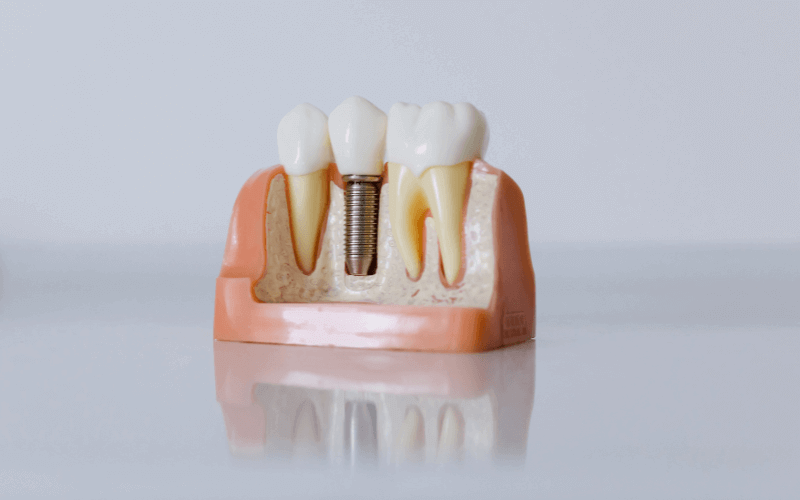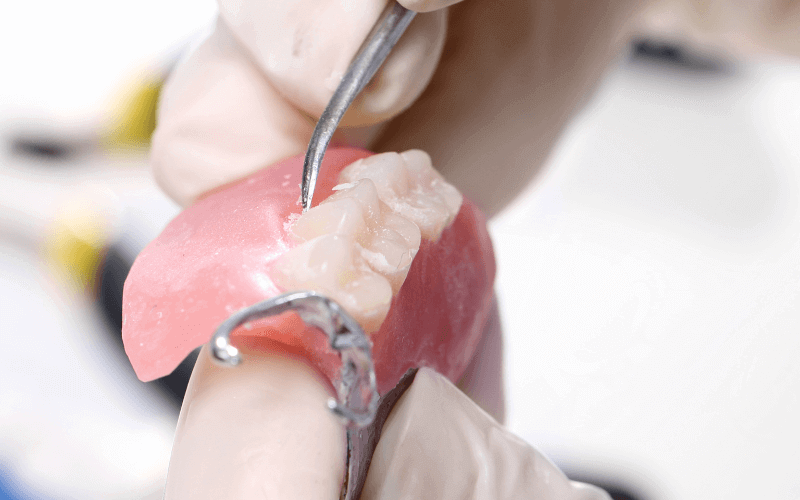When it comes to replacing missing teeth, the two primary options are dental implants and dentures. Both solutions have their unique advantages and disadvantages, making the choice between them a significant decision that can impact your oral health, appearance, and overall quality of life. This blog will look into the key differences between dental implants and dentures, providing a detailed comparison to help you determine the best option for your specific needs.
In essence, dental implants are a modern and permanent solution that offers a natural look and feel, while dentures are a more traditional, non-invasive, and cost-effective option. By understanding the benefits, procedures, and considerations for each, you can make an informed decision about which tooth replacement method will best restore your smile and comfort.
In this blog:
Comparison Table: Dental Implants vs. Dentures
Here’s a quick overview of the differences between Implants and Dentures that can help you make a more informed decision:
| Aspect | Dental Implants | Dentures |
|---|---|---|
| Definition | Permanent solution involving titanium posts in jawbone | Removable dental appliances replacing missing teeth |
| Procedure | Surgical placement, healing, abutments, and crowns | Impressions, creation, fitting, and adjustments |
| Longevity | Potentially lifetime with proper care | Typically 5-10 years, may need replacements |
| Appearance | Natural look and feel, resembles natural teeth | Mimics natural teeth and gums, may require adjustments |
| Functionality | Superior stability, no slipping, easy chewing/speaking | Can slip, may cause discomfort, affects eating/speaking |
| Bone Preservation | Stimulates jawbone, prevents bone loss | No bone stimulation, may lead to bone loss |
| Maintenance | Regular brushing, flossing, dental check-ups | Daily cleaning, proper storage, regular adjustments |
| Cost | Higher initial cost, long-term investment | More affordable upfront, potential ongoing costs |
| Suitability | Requires sufficient jawbone, good overall health | Suitable for most, especially those with health conditions or reduced bone density |
| Procedure Time | Several months (consultation to final placement) | Relatively quick (impressions to fitting) |
| Health Considerations | May not be suitable for uncontrolled diabetes, heavy smokers, etc. | Suitable for broader range of health conditions |
| Adjustment Period | Minimal once healed | Requires adjustment period for fit and comfort |
Understanding Dental Implants

What are Dental Implants?
Dental implants are a permanent solution for replacing missing teeth. They consist of small titanium posts that are surgically placed into the jawbone, acting as artificial tooth roots. These posts provide a strong foundation for fixed or removable replacement teeth, such as crowns, bridges, or implant-supported dentures. The result is a natural-looking and durable solution that closely mimics the function of natural teeth.
Benefits of Dental Implants
Natural Appearance and Durability
Dental implants are designed to match the appearance and function of your natural teeth, providing an aesthetically pleasing result. With proper care and regular dental check-ups, dental implants can potentially last a lifetime, making them a long-lasting and cost-effective investment.
Bone Preservation and Facial Structure Maintenance
One of the significant advantages of dental implants is their ability to stimulate the jawbone, helping to prevent bone loss and maintain your facial structure. This can help avoid an aged facial appearance that often accompanies missing teeth.
Functionality and Stability
Dental implants offer greater stability, allowing you to eat and chew without any issues. Unlike dentures, which can sometimes slip or cause discomfort, implants are securely anchored in the jawbone, providing a stable and functional solution.
Procedure for Getting Dental Implants
The process of getting dental implants involves several steps:
-
- Initial Consultation and Planning
During the initial consultation, your dentist will assess your oral health and determine if you are a suitable candidate for dental implants. This may include X-rays and 3D imaging to evaluate the condition of your jawbone.
-
- Surgical Placement of Implants
The next step involves the surgical placement of the titanium posts into the jawbone. This procedure is typically performed under local anesthesia, and the implants are placed directly into the bone to act as artificial tooth roots.
-
- Healing Period and Osseointegration
After the implants are placed, a healing period of several months is necessary for osseointegration, where the bone grows around the implants, securely anchoring them in place.
-
- Placement of Abutments and Crowns
Once osseointegration is complete, abutments (connectors) are attached to the implants, and custom-made crowns are placed on top, completing the restoration process.
Cost of Dental Implants
While dental implants have a higher upfront cost compared to other tooth replacement options, their long-term benefits and durability make them a worthwhile investment for many individuals. The exact cost can vary based on factors such as the number of implants needed and the complexity of the case.
Suitability and Considerations
Ideal Candidates
Dental implants are suitable for most individuals with good oral and overall health. However, candidates need to have sufficient jawbone density to support the implants. Those with certain health conditions, such as uncontrolled diabetes or heavy smoking, may need to discuss additional considerations with their dentist.
Factors to Consider
Before opting for dental implants, it is essential to consider factors such as your oral health, lifestyle, and financial situation. Consulting with a qualified dentist or oral surgeon can help determine if dental implants are the right choice for your specific needs and circumstances.
Understanding Dentures

What are Dentures?
Dentures, commonly known as false teeth, are removable dental appliances used to replace missing teeth. They are typically made from a combination of materials, including acrylic resin and sometimes metal components. Dentures can be full, replacing all teeth in the upper or lower jaw, or partial, filling in gaps created by one or more missing teeth. Full dentures rest on the gums, while partial dentures are anchored to the remaining natural teeth.
Benefits of Dentures
Restoring Smile and Functionality Dentures can restore the appearance of a natural smile and improve the functionality of your mouth, allowing you to eat, drink, and speak normally. They are designed to mimic the appearance of natural teeth and gums, providing a cosmetic and functional solution for missing teeth.
Affordable and Non-Invasive
Compared to dental implants, dentures are a more affordable and non-invasive option for tooth replacement. They do not require surgery and can be easily adjusted or replaced as needed, making them accessible to a broader range of patients.
Maintaining Facial Structure
Missing teeth can cause facial muscles to sag over time, leading to an aged appearance. Dentures help maintain the structure of your face by providing support to these muscles, ensuring a more youthful look.
Procedure for Getting Dentures
The process of getting dentures involves several steps:
-
- Initial Consultation and Planning
During the initial consultation, your dentist will assess your oral health and discuss the best type of dentures for your needs. This may involve taking impressions of your mouth to create a custom fit.
-
- Creation and Fitting of Dentures
The dentist will create a mold based on the impressions taken and send it to a dental lab where the dentures are fabricated. Once ready, the dentures are fitted, and adjustments are made to ensure a comfortable and secure fit.
-
- Adjustment Period and Follow-Up Care
There will be an adjustment period as you get used to wearing the dentures. During this time, follow-up appointments may be necessary to make further adjustments and ensure the dentures fit correctly and comfortably.
Cost of Dentures
The cost of dentures can vary depending on several factors, including the type of dentures (full or partial), materials used, and any additional treatments needed. Generally, dentures are more affordable than dental implants, making them an accessible option for many patients.
Suitability and Considerations
Ideal Candidates
Dentures are suitable for individuals who have lost several or all of their teeth and are looking for an affordable, non-invasive solution. They are also a good option for those who may not have sufficient jawbone density for dental implants or have certain health conditions that make surgery risky.
Factors to Consider
Before opting for dentures, it is essential to consider factors such as your oral health, lifestyle, and the potential need for adjustments over time. Consulting with a qualified dentist can help determine if dentures are the right choice for your specific needs and circumstances.
Suggested Reading: 7 Signs You Need New Dentures
Comparing Dental Implants and Dentures
Pros and Cons of Dental Implants
Pros
-
- Longevity and Durability: Dental implants are designed to last a lifetime with proper care. They are highly durable and can withstand the pressures of everyday use, such as chewing and speaking.
-
- Natural Appearance and Feel: Implants look and feel like natural teeth, providing a seamless integration with your existing teeth. They are customised to match the colour and shape of your natural teeth.
-
- Bone Preservation: By stimulating the jawbone, implants help prevent bone loss and maintain facial structure. This is crucial for avoiding the sunken look that often accompanies tooth loss.
-
- No Impact on Adjacent Teeth: Unlike dental bridges, implants do not rely on adjacent teeth for support, preserving the health and integrity of the surrounding teeth.
Cons
-
- Higher Upfront Cost: The initial cost of dental implants is higher compared to dentures. However, their durability and longevity often justify the investment.
-
- Surgical Procedure: Getting dental implants involves surgery, which carries inherent risks and requires a healing period. Not everyone is a candidate for surgery, especially those with certain health conditions or insufficient bone density.
-
- Time-Consuming Process: The process of getting implants can take several months, from the initial consultation to the final placement of crowns. This requires patience and commitment.
Pros and Cons of Dentures
Pros
-
- Affordability: Dentures are generally more affordable than dental implants, making them accessible to a wider range of patients.
-
- Non-Invasive: Getting dentures is a non-surgical procedure, which can be an advantage for individuals who are not candidates for surgery due to health conditions or other factors.
-
- Quick Solution: The process of getting dentures is relatively quick compared to dental implants. This allows patients to regain functionality and aesthetics in a shorter time frame.
Cons
-
- Maintenance and Care: Dentures require regular maintenance and care, including cleaning and occasional adjustments. They can also become loose over time, requiring relining or replacement.
-
- Discomfort and Fit Issues: Some patients experience discomfort or difficulty adjusting to dentures. Poorly fitting dentures can cause sores, irritation, and difficulty in eating and speaking.
-
- Bone Loss: Dentures do not provide the same level of stimulation to the jawbone as implants, which can lead to bone loss and changes in facial structure over time.
Suggested Reading: The Do’s And Don’ts Of Denture Care: Expert Advice For New Users
Longevity and Maintenance
Dental Implants
-
- Longevity: With proper care, dental implants can last a lifetime. They are highly durable and resistant to decay.
-
- Maintenance: Implants require regular brushing, flossing, and dental check-ups, similar to natural teeth. Good oral hygiene is essential to prevent gum disease, which can affect the stability of the implants.
Dentures
-
- Longevity: Dentures typically last between 5 to 10 years. They may need adjustments or replacements due to wear and changes in the shape of the gums and jawbone.
-
- Maintenance: Dentures require daily cleaning and proper storage when not in use. Regular dental check-ups are necessary to ensure a proper fit and to monitor the health of the gums and any remaining teeth.
Suggested Reading: How To Maintain And Repair Dentures
Cost Comparison
The cost of dental implants and dentures varies based on several factors, including the number of teeth being replaced, the complexity of the procedure, and geographic location. Generally, dental implants have a higher upfront cost compared to dentures. However, when considering the long-term benefits and durability of implants, many patients find them to be a worthwhile investment. Dentures, on the other hand, offer a more immediate and cost-effective solution, but they may require more frequent replacements and adjustments over time.
Making the Decision: Which is Better for You?
Factors to Consider
When deciding between dental implants and dentures, several factors should be taken into account to determine which option is best suited for your needs and lifestyle. Here are some critical considerations:
Oral Health
-
- Bone Density: Dental implants require sufficient jawbone density for successful placement. If you have experienced significant bone loss, you may need a bone graft before getting implants. Dentures, on the other hand, do not require such procedures and can be fitted even with reduced bone density.
-
- Gum Health: Healthy gums are essential for both implants and dentures. Gum disease can compromise the success of dental implants and affect the fit of dentures.
Overall Health
-
- Medical Conditions: Certain health conditions, such as uncontrolled diabetes or autoimmune diseases, can affect the healing process and success rate of dental implants. Dentures may be a safer option for individuals with these conditions.
-
- Age and Lifestyle: Younger patients or those with an active lifestyle may prefer implants for their durability and functionality. Older patients or those looking for a non-invasive option might find dentures more suitable.
Aesthetic Preferences
-
- Appearance: Dental implants provide a more natural and permanent solution, closely resembling natural teeth. Dentures can also offer a natural look, but they may require more adjustments to maintain their appearance over time.
Functionality
-
- Eating and Speaking: Implants offer superior stability and functionality, allowing you to eat and speak with confidence. Dentures can sometimes slip or cause difficulty in chewing certain foods, especially if they are not fitted correctly.
Cost
-
- Upfront vs. Long-term Costs: While dental implants have a higher initial cost, they are a long-term investment that can last a lifetime with proper care. Dentures are more affordable upfront but may require replacements and adjustments over time, leading to additional costs.
Consulting with a Dental Professional
Choosing between dental implants and dentures is a significant decision that should be made in consultation with a qualified dental professional. Here’s why consulting with your dentist is crucial:
Personalised Assessment
-
- Oral Examination: Your dentist will conduct a thorough examination of your mouth, including X-rays and possibly 3D imaging, to assess your oral health and bone density. This assessment helps determine whether you are a suitable candidate for implants or dentures.
-
- Health History: Your dentist will review your medical history to identify any conditions that might affect your treatment options.
Customised Treatment Plan
-
- Recommendation: Based on the assessment, your dentist will recommend the best tooth replacement option tailored to your specific needs and preferences.
-
- Detailed Information: Your dentist will provide detailed information about the procedures, costs, benefits, and potential risks associated with both implants and dentures, helping you make an informed decision.
Ongoing Support and Care
-
- Follow-up Care: Regardless of the option you choose, regular dental check-ups are essential to monitor the health of your mouth and the condition of your implants or dentures. Your dentist will provide guidance on maintaining good oral hygiene and caring for your new teeth.
Choosing between dental implants and dentures is a crucial decision that depends on various factors, including your oral and overall health, lifestyle, aesthetic preferences, and budget. Dental implants offer a durable, natural-looking solution with long-term benefits, while dentures provide a more affordable, non-invasive option with their own set of advantages. By consulting with a qualified dental professional, you can make an informed choice that best meets your needs and helps you achieve a healthy, confident smile.
Discover the Best Tooth Replacement Option for You at Dental Aspects
At Dental Aspects, we understand the importance of choosing the right solution for replacing missing teeth. Whether you’re considering dental implants for their durability and natural appearance or dentures for their affordability and non-invasive nature, our experienced dental professionals are here to guide you through the process. With personalised consultations and tailored treatment plans, we ensure you receive the best care suited to your unique needs.
Don’t let missing teeth impact your confidence and oral health. Book an appointment at our Browns Plains Dental Clinic today to explore your options and take the first step towards a healthier, more confident smile.
Learn More About Our Full Range of Dental Services
At Dental Aspects, we’re proud to be the #1 rated dentist in Browns Plains, QLD, and offer a wide array of services, including General Dentistry, Cosmetic Dental Procedures, Children’s Dentistry, Root Canal Treatment, and Emergency Dental Care. Our team is dedicated to providing personalised and comprehensive dental care to meet all your oral health needs. Book an appointment today to experience our exceptional service and achieve a healthy, beautiful smile.
Keep Reading: 10 Questions To Ask Your Dentist Before Any Dental Procedure


